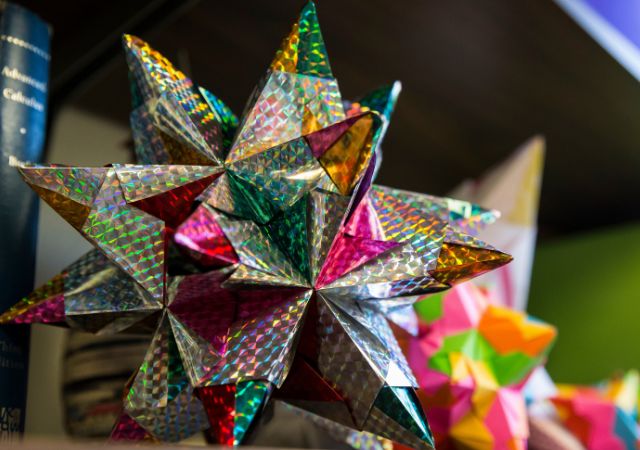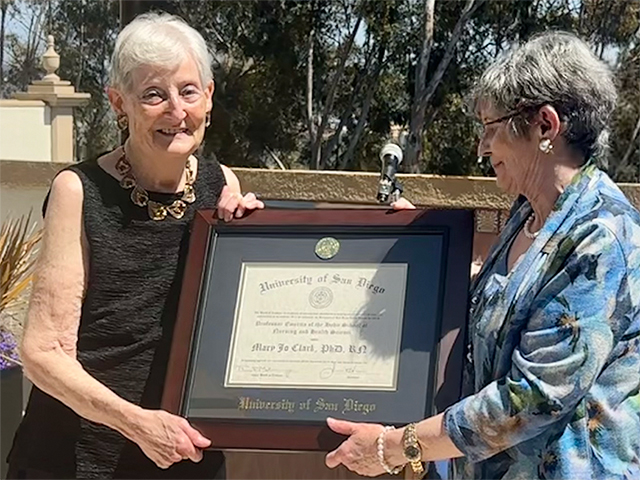Dispatches from Uganda: One Very Successful Adventure
Editor's Note: A water quality and public health research project in Uganda has the full attention of an interdisciplinary group — including USD faculty members, students, President James T. Harris and his wife, Mary — all of whom are excited to show what it means to make a difference in the world. Ryan T. Blystone, editor of the USD News Center, is in Uganda to document the trip.
It is appropriate to be writing this final entry about my Intersession trip to Uganda while riding on a bumpy dirt road in a vehicle built for adventure.
We left Murchison Falls National Park after two days of game drives, a boat safari and a hike that put us very close to epic waterfalls. Now, we're going fast, taking the bumps in stride, since we’ve now embraced that this is just how we will roll here. Don't worry, everyone is wearing their seat belt.
Yes, it’s been quite a journey for all of the University of San Diego group. Students, faculty, staff — and even President James T. Harris and Mary Harris for a time — have experienced change to varying degrees. The adage that you learn something new every day most definitely applies in Uganda.
Sure, there’s the part of you that tries to stay grounded — expecting that people need to be ready to go, bags packed, at the car by 7 a.m. — but when those plans go awry and someone notes, “We’re on Uganda time,” it’s best to embrace the fact that you're in a different country, mingling with a different culture and realize that your priorities aren't always shared. Most important, everything is completely okay. Especially if you just accept being outside your comfort zone, you tend to adjust quicker.
Since our plane landed in Entebbe on Jan. 2, in a country with 44 million people that’s 11 hours ahead of California, I’ve been fully immersed in the ways of Uganda. I've admired its beauty, seen hope and pangs of hopelessness, enjoyed new tastes and marveled at the hospitable people I've met. I've said "hello" and "good day" to so many people who respond enthusiastically, and have tolerated the mosquitoes when I've gone too long between spraying Deet on myself.
We've been thriving while staying in big cities such as Kampala and Mbarara. Our group worked hard at medical clinics in Kyabirukwa and Rubindi, where nearly 500 children received medical care. Our undergraduate researchers did water sampling and testing near Isingiro in the country's largest refugee settlement camp (more than 120,000) and in Kyabirukwa and Kashongi.
Learning and being outside of one's comfort zone has been constant for me and five of eight students who are newcomers to Uganda and Africa.
Asked for an overview of her first trip as it closes, senior mechanical engineering major Christina Kozlovsky says she’s enjoyed everything: “I’ve learned a lot, and I’ve found a lot of answers, but I still have so many questions.”
I couldn’t have expressed it better. Traveling to a new country, or any country, should produce a similar response. That said, here are a few observations I've made:
The People
Without a doubt, the Ugandan people have been the most delightful part of this 19-day trip. Exchanging pleasantries with employees at venues we stayed at, along with countless opportunities to interact with people at AidChild Leadership Institute, Kampala's Olive Garden and Mbarara's Montfort House, Mbarara University Science and Technology (MUST), Holy Innocents Children's Hospital, having a personal audience with Mbarara Archbishop Most Rev. Paul K. Bakyenga and great interaction with Gorilla Link Tours owner Carol Amutuhaire and her experienced drivers, we all witnessed the joy of visiting the country known as the "Pearl of Africa."
"What makes Uganda tick, what makes it stand out is its people," says Gad Ruzaaza, director of Mbarara University of Science and Technology's Community-Based Education Research and Service Program.
"Ugandans are friendly people, resilient. We've pushed through the wars of the 1970s as well as the 1980s, when AIDS was rampant. It's the resiliency of the people to really aim high when they are going through challenges, to come out victorious and walk together toward mutual survival. They look with hope for the next day. They are receptive to new ways of doing things and they don't stop trying," he said.
Education Now, Going Forward
Ruzaaza's vision comes through his 20 years of work in education with students who can use what they learn at Mbarara University and strengthen themselves to be productive in the world they're living in.
"I think education addresses the real needs of society," he said. "For countries such as Uganda, it's very important. Education leads to the development of its stakeholders."
While the long-term purpose of USD's involvement in Uganda is a water-quality project, USD Chemistry Professor and project leader Jim Bolender, PhD, was joined this January by faculty members from engineering, nursing and biology to meet with MUST officials. It was a chance to learn more and look into opportunities for broader collaboration, even the possibility of signing a memorandum of understanding in the near future.
USD Mechanical Engineering Department Chair and Professor Frank Jacobitz, PhD, was impressed with MUST, its growing interest in a strong engineering program, new facilities and potential for a deep collaboration. He was in multiple meetings with MUST officials, gave a short presentation about USD engineering, compared curriculums and talked about the teamwork traits of Torero students.
"I was pleasantly surprised to see the development," Jacobitz said after his MUST interactions. "They're very energetic, they've built programs very rapidly, have student growth, new facilities, they've hired good faculty, all of whom have done work abroad, so they're aware of the academic landscape on a global scale. Coming back with that mindset, they really know where they need to go.
“Now it's a question of do they continue to get the right resources? I feel there's a lot of potential," Jacobitz continued. "I feel we took a huge step forward. I don't feel in any direction that we've hit a wall. I believe there's a lot of space where can go, moving forward."
Working Together
Because this trip about both research and business, it was terrific to see the ways in which an eight all-female student group, represented by biochemistry, engineering, behavioral neuroscience and nursing, worked together.
Nursing students were joined by most of the undergraduates for medical clinics to help in any way they could and learn about the Uganda people and see their perseverance firsthand. Nurses, at the behest of Nursing Professor Dr. Martha Fuller, got an up-close glimpse of the water quality work, witnessing the sample collection process. Kozlovsky, the lone engineering student, collaborated with both groups while collecting materials and working on her own research project. She described it as having a strong team approach.
"I think the diversity of our group really is our biggest strength," agreed Natalie North-Cole, a 2019 behavioral neuroscience grad and chemistry minor, who returned to Uganda for a second straight January to help with sampling and testing. "We're able to tap into each other's expertise, learn from each other and collaborate better. The interdisciplinary learning really helps our project grow and become bigger."
The truest meaning of working together, however, came when the USD group hosted a farewell goat roast with community members at Montfort House. A special night of food, praise and even a special local dance performance led up to the announcement that the entire USD group had chipped in to make a total donation of 2.4 million Uganda Schillings to Holy Innocents Children's Hospital.
It was a genuine act by a group of Toreros who were determined to not let any bumpy roads ever get the better of them.
— Ryan T. Blystone
Photo slideshow shots by Jim Bolender and Ryan T. Blystone
Contact:
USD News Center
news@sandiego.edu
(619) 260-4681




